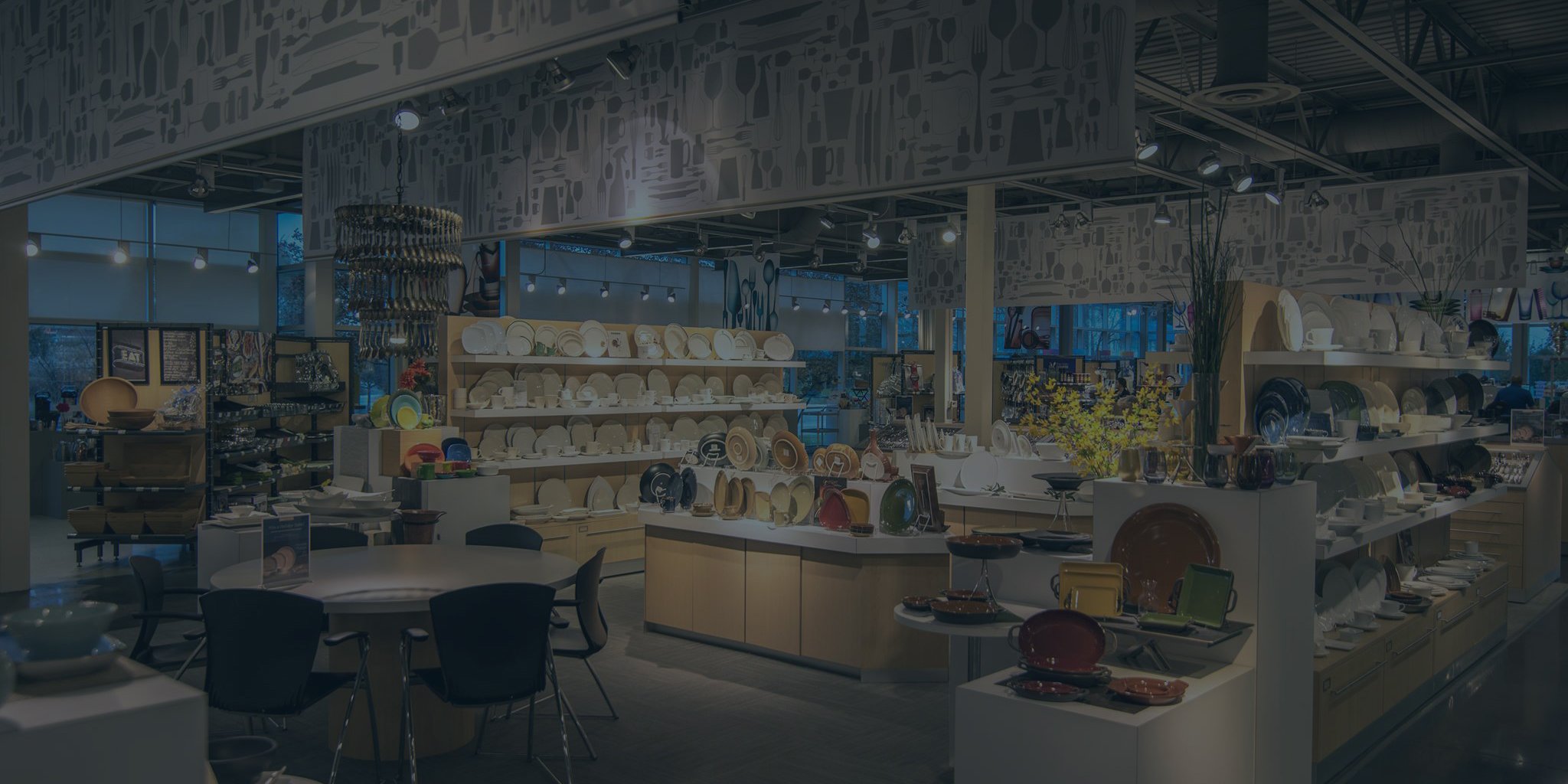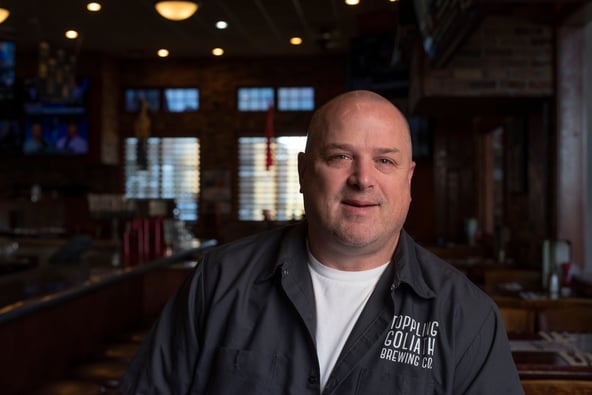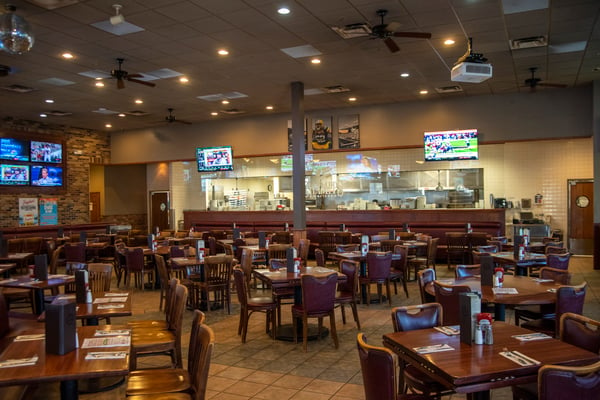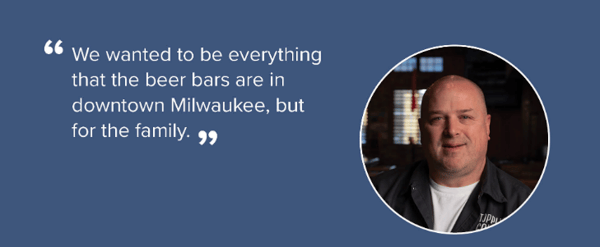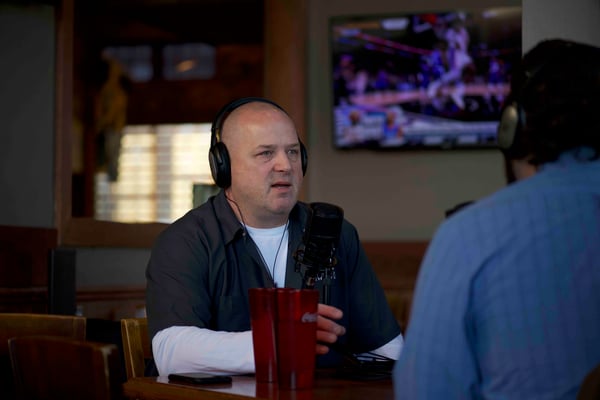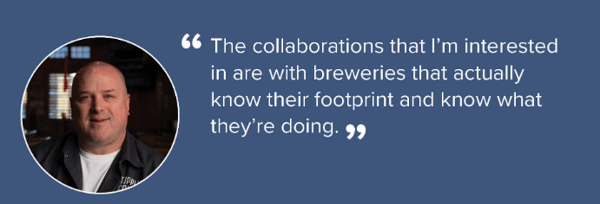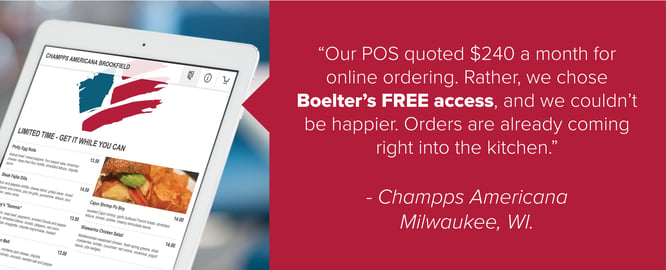A special customer spotlight episode of the Boelter Wire, this episode was recorded in early March 2020 before restrictions due to the ongoing COVID-19 pandemic.
Hear Rob Frost, Principal of Boelter Blue speak with Tony Lewanovich of Champps Americana in Brookfield, Wisconsin. Tony began working for Champs in 2000 before becoming the owner of the Brookfield location in 2012. Over the span of his 30-year career, Tony has evolved the traditional sports restaurant model and transformed Champs Americana into the widely known destination for craft beer it has become today.
Want to see what we can do for you and your brewery or restaurant ? Get in touch.
Have a topic you'd like us to discuss? Send us your ideas at marketing@boelter.com!
Excerpts
Rob Frost: Welcome to the Boelter Wire. We're here probably in the best beer bar in the Midwest, maybe the best beer bar in the country with the guy who owns and runs it. Tony, how are you doing today?
Tony Lewanovich: Doing good, man. Thanks for the offer.
Yeah, well Champs is a local institution, but you got some notoriety in the Midwest, right? For the beer selection and what you do here with the program?
Tony:Yeah. You know, I think that, everybody comes out with “a best beer bar.” I always kind of walk away from using the word “best” because again, it's relative to so many different factors that everybody has a home bar, a home craft bar, whatever the best of Milwaukee, the best in Green Bay, best of Madison, all of that stuff. Yeah, I mean we, we have gotten a lot of recognition and it's very much appreciated.
It's good to hear you're humble about it still. Because that's how you keep growing and keep doing better. Right? How'd you get started? Where, how, how long have you been with Champps? Why? Just give me the little bit of background.
Tony: I met Champs one week before I met my wife back in 1990 working at West seventh street in Saint Paul, Minnesota. Probably the best guy I've ever dealt with in my entire life. Blackie Landreville. I was with them through 2000. Then I had an opportunity to come down to Milwaukee with Bill Edders Franchise Group down here. And at the time we had Greenfield, Brookfield, and I was the director of operations for them through 2011. About a year after they had sold the Greenfield location to the current owners down there, I was able to work on a deal with my current partner, Ty Vaughn, to acquire this one. So I've owned it since December of 2012.
But you've been with champs for 30 years. So that's what I know. I didn't know that you'd only own this one since 2000. But, that makes sense, because it's really made the shift towards the craft beer focus in that time, in that timeframe.
Tony: Yeah. You know, it's funny, I talked to Bill Edder, who was my partner before, and he said, God, we didn't sell, we didn't get the right asking price from you. We sold it too cheap. And I started laughing. I said, you didn't sell too cheap. You just weren't willing to go that extra mile. You know what I mean? They had a comfort level with what they would allow beer to be. They didn't want their restaurant to be overturned by alcohol, but yet they wanted it still to be, a big part of it. So, they didn't want to, they wanted to do what a lot of bar owners do, which is, they didn't want to break out of their comfort zone. They didn't want to go that extra mile. They didn't want the inconvenience of it.
So, who's they? So Champps is a franchise?
Tony: Champps is a corporation. We are a franchisee, but we operate with, with absolutely no mandates.
How’d you get that deal?
Tony: Well, you know, it's funny. They had 70 plus stores in the nation and now they're down to nine. So, the major chains in America all suffer from the same liability, which is basically what I just said. You know, if one does a two for 20 for your meal service, the other's going to do a two for 20 for their meal service. They don't want the inconvenience of the operation. They want to just kind of piggy back off one market to the next and assume that you can do that. Well, Chi-Chis learned that a long time ago.
There’s a name from the past.
Tony: Think about their downside though they were so dominant in that market for so long for sports, like the trivia, volleyball, everything. And they started making everything the same recipe nationwide. Well, you can't do that. You know what I mean? You've got different flares, you've got different thoughts, you have different regional attributes that you've got to be able to market, you know, to your consumer. And when you get into kind of a cookie cutter kind of lifestyle, you lose. So Champps corporate was a byproduct of that. They have one database they wanted to sell their tap handles, you know, off to whoever. So, you could be a brewery of the month, you could do whatever you wanted, but if you had 30 beers on tap, 26 of them were mandated, you know, national brands.
That's not going to fly.
Tony: Well, they were slow to react. Let's just leave it at that. They've done some nice things over the last few years with a couple of new brands. They're converting some of their older buildings and concepts and all that to a concept called Craft Republican and all those things. But from my standpoint, royalty checks are royalty checks. Man, I still have to pay.
So, would you say that they're learning more from you now or are there, you're helping them more? Or is it just kind of a symbiotic thing?
Jason: I would say they're unwilling to learn. They have no interest in it. They don't want the deal, like we do here, where the majority of our beers are one in one out, you know, it's an inconvenience to them. If they don't, they just don't want to put the labor control into it.
Gotcha. So how many beers, so this is a beer bar, but you have amazing food. You have giant space here, great location. So how many beers do you keep on tap and why did you go beer? Why was that the way to differentiate yourself? I mean, you just said we can't do cookie cutter. We can't, you know, do all those things and to not stand out. So why was beer the answer?
Tony: You know, that's a great question. Justin Smith, who's down at the Hale House now, he and I had always talked about doing, you know, could we scale this place up to that level? When you talk about the best beer bars in Milwaukee you’re talking Sugar Maple, Bernhardt's, all of that. No servers on the floor. You have Romans, Mike Romans, you've got two knowledgeable bartenders. That's your staff. You're talking about here at Champps where we've got 360 seats on any given day.
That’s so many seats.
Tony: It is and how do you scale that, knowledge-wise, to your staff?
I’d love to know?
Tony: That was the big issue back then, we had this crazy idea, but we're like, God, that's just wild to be able to do what these guys are doing in tiny little footprints in such a big space. It took a lot of thought. It took a lot of pressure, but when I made the decision with my partner to buy Champps, it was not to second guess ourselves. It was, we had to be mentally sharp and prepared to do what we were setting out to be. We wanted to be everything that the beer bars are downtown Milwaukee for the family. We wanted the family to feel comfortable that, hey, you know, we're not going to load up our four and our five-year-old and head down to Bayview, to hang out on a Saturday afternoon. You know, you're just not going to do nothing against them. Yeah. So we set out on that journey and, and I still left back to our first anniversary party. We thought we were so bad, man. I mean, we had Three Floyds Alpha Claws on tap and we're just like, wow, look at us go. Founders Backwoods Bastards on tap. Wow. We're just bad asses.
Was that your first, was that 2011 when you took over? You didn't have an anniversary in your first year? Of course.
Tony: The first, I believe what we're heading, this will be the sixth year in 2020 so it's backing up, you know, you're looking at 2014, 2015.
So, we'll talk about the anniversary party in just a second, because that's an unbelievable event. It really is. But I want to go back just a second and talk about your staff. Because a place like the Yard House, you know, this is a franchised beer bar. They have a lot of craft beer, certainly not the depth and you know, maybe the quality that a Champps has, but I'm sure they face a similar challenge of trying to educate their staff and push the beer and make people feel comfortable about ordering something they've never had before. Is that a focus for you to educate all the way down to the servers at the tables or is it mostly just the bar staff? Because I think a lot of operators could learn from what you've done here and sell more great beer.
Jason: Yeah. I mean the education is ongoing. I mean it's always ongoing. Making sure, you know what I mean? Again, I don't want to promote people drinking constantly throughout their shift and things like that. But our staff, whenever a new beer pops on tap that is North of 21 years old, they're going to come by and pour in one ounce sample and they're going to really be able to educate the guests off of that. We focus on everybody and the main reason being for that is because our staff is not dedicated to work in one specific area. We have bartenders that are servers that are criss crossing over into the dining area. Any server in our building works in the bar. I mean, every single server works down here, whether they're 20, 21 or whatever, you know, so it's a great lineal training program, I guess is what I'd like to say. Th hardest part that we had to get used to, was the multitude of the serving sizes. You know, whether you've got the five-ounce taster glass, you've got the goose Island seven fives, you've got the 10 you got the 12 you've got the 14.5 you've got the pint, the mug and everything.
So, we've kind of seen this trend at, at Boelter with premiumization. That's a big word for me right now. But trying to, you know, up the experience and then serve in the right glasses and do those things. Sounds like you're focused on that as well.
Tony: Yeah, we targeted the last big glass thing that we did, we targeted the Teku glass for the IPAs, you know and we had been pouring Todd the Axeman in a pint and had a couple of beer nerds come in and they're like, Hey man, you promote yourself as being a great craft beer bar, but you're pouring in a pint glass man, you can't do that. I'm losing the aromatic presence of the IPA and the hops just aren't there for me. So, I think it's, it's give and take. We can laugh about a lot of the stuff, but the presentation is the key, you know what I mean? It's making sure the glassware is indicative of the product that it's supposed to be holding.
So, you've got knowledgeable staff, you've got the proper service, the proper presentation. But how do you decide what actually goes on tap? How do you manage that? We don't have 10 hours, but gimme something.
Tony: Boy, that's a good question. Listen, I want to carry everyone's beer. But, if you are a brewer of your beer and you know, there's plenty of great beer in Milwaukee, there's, there's plenty of bad beer in Milwaukee, let's be honest about it. You know what I mean? There's plenty of restaurants and bars that are great and plenty of restaurants, bars that aren't great.
That's with everything.
Tony: That's with everything. Just because you make craft beer, it doesn't mean that you're entitled to be somewhere. We had an interesting conversation with a brewer that had opened up about a year and a half ago and three months into the production came in and said, came in on a Friday night, asked for me and said, Hey man, you know, we're finally at the point that we've got some liquid that we can get into the market. So, I'm targeting you, Brass Tap, Sugar Maple and Bernhardt's as the four bars that I'm going to put my beer in. I said, boy, that's some pretty lofty expectations right there. You're going to just walk into those four places and say, Hey, I got beer here, have it. Without sampling it, without trying it, without even discussing it. I go, that's pretty ballsy. I said, I respect that, but let's start with this. Give me some samples first.
Yeah, what's the beer taste like?
Tony: Yeah, let me look at the beer in the glass. Let me smell it. Let me taste it. Let me do all those things. And I think that the be all end all is that everybody deserves a shot at some point in time. The only way you find out if the beer is any good is if the consumer wants to drink it. If they order it.
People vote with their feet.
Tony: Yeah. You know what I mean? It's tap takeovers are long gone for this very reason. You know, we don't do tap takeovers anymore because all it's going to do is stagnate your lines. You know what I mean? If I did an event with Half Acre Revolution out of Chicago versus Microphone Hop Butcher a phase three coming up, the beer is just going to sit, it isn't going to go anywhere. And I think that the relative fact with that is that what we decided to do is, is by keeping this program in place of pretty much one in one out on a lot of these kegs, is it's constantly rotating and fresh and it gives us greater availability to buy more. And at the end of the day, that's what people, that's what distributors and brewers want is they want the turn of the keg. They don't want that to sit.
So, is your relationships with the breweries and the distributors a reason that you get so many amazing beers or is it a function of just the volume that you do? I don't want to diminish what's happening here. Cause it sounds like your reputation, your respect, your care for the beer itself, you know, people know their product is going to be presented in the right way and maybe that's the environment that they want their best beers to be in. I don't know, I guess I'm asking you.
Tony: I mean there's two ways of thought on that. Number one, there's a lot of lazy bar owners that will look at my tap list or other people's tap lists and just say, Hey, he has it. I want it. You know, and the reality is I sent an email to Tree House yesterday, the Tree House out in Massachusetts. And I sent him an email asking them if they would, if they do a pop-up can sale shop here at Champps. Send me 200 cases of beer, through P-quad distributors here.
That'd be a huge event here in Milwaukee.
Tony: Yeah. But I guess what I'm getting at there is I'm constantly throwing darts. I'm constantly throwing darts and I stay on top of people. I've been hunting Phase Three for 18 months. I mean 18 months I've been hunting these guys, I've been stalking them on Twitter. You know what I mean? I don't know if that's flattering, if I can get arrested for it, but it'd be literally every comment that they make, every beer that they make, I'm replying to it and saying bring it to Champps, bring to Champps, bring into Champps, bring it to Champps, and then all of a sudden they call and say, Hey, it's coming to Champps. And I'm like, I came running out of the out of the office cause I'm going to Hawaii next Friday. I'm not even going to be here for March madness, but I'm here on Thursday and on Thursday I laughed at the managers here, so I'll be here for the Phase Three microphone event. You know, we get the beer because people know I want it. Number one, they know I want it that bad. I wouldn't be on him if I didn't want it, because I drink too much beer. But the reality is, it's a byproduct of volume. The fact that we move so much volume and that we care for it. There's so many beer bars that will tap beers on a Friday, take them off tap on a Saturday, put them back in the cooler and hold them for a future day because they're doing so many events. They're not protecting the integrity of the liquid. Every time you take a beer off tap, it causes problems with the, with the quality of the beer, you know. And we don't do that, leading into the anniversary party, we don't have any banger beers on. We'll be down to 27 beers on tap and people will still come in and drink those beers. You know, just to help us get the liquid out of the building because we don't take them out.
So, you can fill up the lines for the party. You know, I'm just sitting here kind of grinning from ear to ear because the kegs don't just show up magically on the doorstep. And it's the same answer for almost every problem. Have a little respect, have a little care, put in the leg work and the beer shows up. You know? So it's not like it sounds easy, but we all know in practice that it certainly isn't. It takes time and energy and effort, but it sounds like you love it. Which makes it easier
Tony: It's the golden goose. I mean, I love the people that are, all the naysayers out there right now, they're telling me that the craft beer industry is dying, that it's hit it's maturation point.
I heard a rumor that this is going to be a seltzer bar.
Tony: There's one absolute certainty in life and that is that hard seltzer will not be on tap a Champps. And to the bar owners that are out there, guys, if you're a craft beer bar owner and there's one category, one segment that is killing craft beer, it's the seltzer category. So why would you further offer the opportunity for them to come in and kill your brand? I mean, all of them are coming in, you know. We just sit here and laugh because we have Humble Forager launching on Friday here. Forager from Rochester, Minnesota.
I'm not familiar.
Tony: Phenomenal, phenomenal brewery. But Minnesota is one of those antiquated States that I grew up in so I can rip on ‘em. But if you, if you are a brewery in Minnesota, you can't distro, I mean you just can't distro if you're brew like a brewpub. So, Forager, in order to kind of wiggle around that, is in a contract brewing situation now with Octopi.
Because Forager’s a brewpub?
Tony: Forager’s is a brew pub. So, they can't distro around Minnesota. So, what they're going to do now is they're going to contract brew under a new name called Humble Forager in, up in Waunakee with Octopi. And then they're going to ship the beer. This how screwed up this is. They have to then in turn ship the beer back to themselves and open up like a distributor place up there so that they can sell that product to their market.
Wow. Wow. Wow. But there's all sorts of things like that in the liquor industry, in laws or things. So one last thing before we get the anniversary party. So not only do you put beers on tap that come from, you know, a diverse range of craft breweries, but you do some collaborations too, right? You've done one or two.
Tony: Yeah. I actually just found out that, the O G Tony Had Hair in the 90s with Eagle Park is going to be released in about two weeks. By the end of March.
They're going to, can it?
Tony: Yeah. They're, they're doing the whole launch again. Cans, draft all of that again.
Tony had Hair in the 90s. I had it at Eagle Park and I've had it here. Delicious. At both spots. But to know that I can bring it home in cans.
Tony: Yeah. So that's, that's coming up. Yeah. You know, we, the collaborations that, that I'm interested in doing are with breweries that actually know their footprint and know what they do. I'd love to do something with Anello and the team up at Central Waters. You know, we've talked about doing a beer with them because they put so much time into their craft.Mike at Microphone. I would love to do something with him for the same very reason.
So, kind of moving on to the anniversary party, I mean, beer events in general and events at restaurants and bars. You said it earlier, you know, tap takeovers and all these places are doing all these events and pairings and tastings. You guys do your fair share of releases and event-style things. But the event to end all events at Champps is the anniversary party. I mean, this is a ticketed event for at the bar, right?
Tony: Well, it's evolved.God, going back to the first anniversary party to the nightmarish, third anniversary party, you know, we thought we had a good idea every step of the way. So starting with the first year we, we did it on a Friday. We had no understanding, no expectation. And quite honestly the beer that we're serving, that first anniversary party, it was really nothing spectacular. We had just promoted it that it was going to be that great and people loved it. Year two was like psychedelic. I mean it was just off the chains. I mean we just got crushed.
You're going to have to explain on that because you can't use that adjective and not give me a little more.
Tony: Well, what I mean when, when you come up with, you know, adrenaline is a drug, you know, and when you know you've, you think that you did something really unique and spectacular and all of this stuff and then it comes to fruition. I mean you're sitting there, you're like, holy shit man. I mean that's just, that was wild. So we had a memory lapse between your two and year three. So year three comes around and we have a guy sleeping in his car from Iowa. He drove in by himself from Des Moines, Iowa. And he's sleeping in front first spot out here at 4:30 in the morning, sleeping in his car.
Then you know, it's a thing now.
Tony: Yeah. The next car they pulled in was Kansas, the next one was Michigan and you're like, uh-oh. You know, we started to think about it. So, I went to the back and I saw by 6:00 AM we had a line forming outside. We didn't open till 10 and we got a line forming and I'm like, guys start making some bacon. What's going on out there?
I remember this when you took bacon out.
Tony: I said, oh my Lord, this is going to be, this is going to be off the chain. Well by nine o'clock the line was wrapped all the way around the back of the hotel back here. I'm tossing cans of Oskar blues, barely 10 fitty out to the people out back that are trying to get in. And we were so confident and so ignorant at the same time because back then we didn't do timed releases. It was just like the wild, wild West. Just open the faucets and let's go. Well these people outside come into that barrel event were hammered by 8:00 AM. The bottle share they're doing outside in the parking lot. You know what, I'm sitting here thinking about it at the time I said, what the hell did we create here? I mean, this is just absolutely crazy. You know. So then what happens? Everyone comes in. I had a server that fell and had to be taken out, you know, hit her head on the ground. So when she went down, it took three managers with her. It took another server with them. It left a section of the building open where there was no service because you can't react to it. And everybody that came in was trying to buy five, six different beers. We had a guy pass out in the bathroom at 11:15 in the morning and that's when we kind of had to look at it in a different light. So then we changed it and instead of, you know, I didn't want a guy from Kansas and a guy from Iowa one day a year to get the best seat at my bar for the anniversary party, you know, so we, we made a lot of adjustments for year four and then subsequently year five that really transitioned the entry times, staggered them so that we could get beer into people's hands right away. And then service just follows. Once you get in that role, everything's great. So then we introduced the time tappings and people came. So, you can't operate them and no way you're going to be able to do that. We did it, you know, we launched at 11 o'clock.
So certain kegs are being tapped at certain times of day?
Tony: Yeah. So it wasn't, they weren't all coming on draft at once. It wasn't all going to be wild wild West. So, at 10:50 that year we launched five different variations of Oscar blues Barrel Age.
Wait five variations? That's the kind of, just, I'm going to let that sink in for a second. That’s the kind of beer we're talking about on tap, this isn't your normal…
Tony: Yeah, yeah, yeah. You know, and then at noon we'd do, you know, six kegs of Bourbon County Stout. Then at one o'clock we'd do everything with Central Waters with Couple of Years of Black Gold and everything that they had available. Then Toppling Goliath would come in and kick everyone's ass with some rare barrel and everybody would go, home happy and all that stuff. It just, it brought in such an ease of the control. The numbers are always going to be the numbers, right? You're always going to have big volume, but the reality is if you can, if you can mentally prepare your staff and mentally prepare yourself for that onslaught, only in 10-minute windows, that's all it was. You know, those first 10 minutes when you announced the time tapping we were pre pouring our glasses so we were set up for success. Whereas in year three, we were set up for complete failure, you know, and again, it had to be rerouted and rethought about at that point. But yeah, I mean the beer, God, the beers, the beer man. I mean it's just, it's crazy.
I hear, this is another rumor, that you might have a keg of Assassin somewhere in the building.
Tony: No, we, we actually did that for Mike Roman's event.
Oh, you did?
Tony: Yeah. Back in January we got, we had actually, it was Vanilla Bean Coffee Assassin, that we had here. We donated the keg. Toppling Goliath worked with us on that and all the proceeds from that keg, everything, went to Mike, Mike Roman's fund. Yeah. So that was our event that we did there. But yeah, nine times out of 10, you know, and during the course of the year, if we get a barrel, we call it Tuesday. Everyone around town, if they get like a rare barrel of Bourbon County Stout sometime unexpected during the year they had post this huge event, Hey, I've got this wild beer get in here, get in here. We call it a Tuesday at Champps, we'll just tap it unannounced at 11 o'clock on a Tuesday to get people to, or to get the liquid more into a regular customer's hands.
So, getting that beer into a regular customers' hands I think is actually one of the most cool things about champs because it makes it all so accessible. Maybe it's because you have so much good beer all the time that you're just, you can always come in here and get an amazing beer. But it's, I think it's one of the things that makes you different honestly.
Tony: Yeah. You know what I mean? I think it, well it's a respect on all levels. We have respect with our breweries, we have respect with our distributors. It helps that you pay your bills on time. Anybody out there that, wants to know about that, if you pay your bills on time. Great things happen.
So, kind of to wrap things up with the podcast, what, what else does the future hold for Champps? Is there any exciting news, anything that you want to share?
Tony: You know, it's when we got into this, it was going to be a consistency. You know, every day you come in here, you're going to consistently get a good product. Whether it's from the kitchen, whether it's the sporting, you know, we just did our huge TV remodel right before March Madness here. Whether it's the service standard, you know, we wanted to model it, we wanted to have a memorable experience every single time that you could come in, whether it's the daily banter with Stephan behind the bar, whether it's the constant presence of a management team that that has worked together. Rob and I had been together for 20 years. You know what I mean? You think about that, that if you come into this building over the last 20 years, you're going to get either I or Rob on every single day of the week.
That kind of consistency in leadership in a restaurant is virtually nonexistent.
Tony: It is. It is 100%. You know, and I think that, you know, from Rob and I's standpoint, we've been able to identify each other's strengths and stay out of the way of that, you know, so Rob has a skill set that I have no desire to be a part of. And I have a skill set that Rob has no desire to be a part of. You know, it works, and it matches. You know what I mean? Exciting things. Yeah. I mean the beers getting better. You know, everything that we do here is getting better. We just did a remodel and now I'm looking at doing another remodel, you know, and just constantly trying to reshape and refocus on everything. Like you said about the beer, it's throwing darts. It's just throwing darts man and hoping somebody does it. You know what I mean? We'll have something going on here next week with Hot Butcher out of Chicago, which is exciting. Cause they make great beer. We'll have stuff with Microphone and Phase Three, which is great. We’ll have Humble Forager coming in, which is great. So, what I know today is probably going to be completely irrelevant in about six months, because it changes that much.
But you're growing, you learn it. That’s the fun part, right?
Tony: Yeah. Exciting. Hawaii a week from Friday.
That'll be exciting.
Tony: Yeah. I'm guessing I'm probably going to get sat down on a beach at some point in time by the wife and tried to talk about a future idea and all that. I'd love to, I would love to collaborate on with, with another brewery and open up a joint venture with them. That's what I would like to do.
Breweries out there. Listen to this man.
Tony: Oh, there's one guy out there that knows exactly who it's directed at, but yeah, I want to, I want to take a brewpub to Mukwonago. Champps food with a specific beer or a specific brewery out into the Mukwonago area. I think Mukwonago is ripe for it right now. I think they would, I think they would love it. I think it would be accessible, I think is the best thing to put up on it. But yeah, that, that gentleman knows who he is.
Good. Well, thanks for taking at least a half an hour of your time. That went so fast for me, but I'm sure it was at least a half hour letting us come into the restaurant. It's been fun. We'll look forward to whatever your next ventures are and I'll see you for lunch soon!
Tony: All right. Thanks guys.
Want to chat with a Boelter expert on Marketing ? Get in touch!
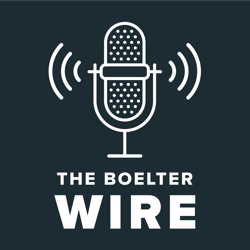
The Boelter Wire is an episodic podcast that focuses on thought-leadership conversations with industry experts and established partners, and is designed to help listeners evolve their business, stay competitive and pursue their passions.
Subscribe to The Boelter Wire here or on Spotify, Google Play, Apple Podcasts or Amazon Music.
.jpg?width=192&name=BLT_Only_Logo_Black%20(19).jpg)
